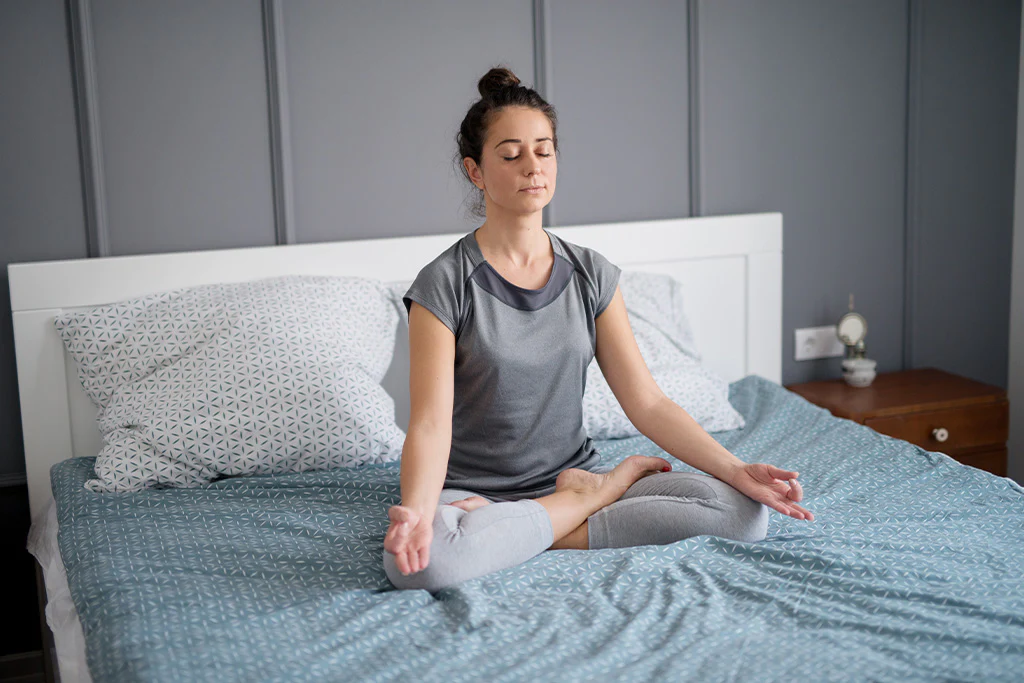Meditation has only become more popular in recent years as people search for ways to reduce stress and improve their overall well-being, however, it’s not as well known that meditation can also have a positive impact on sleep. In fact, there are many lesser known benefits on how meditation and mindfulness practices can help you get a better night’s rest.
Reduces Stress and Anxiety
By far, stress and anxiety are two of the most prominently cited causes of poor sleep quality. When we’re feeling stressed or anxious, it can be difficult to quiet our minds and relax into a restful state. Although, the good news is that meditation can help alleviate these feelings by promoting relaxation and reducing the production of stress hormones.
When we meditate, we’re able to focus our attention on our breath and quiet our thoughts. This goes a long way in helping reduce the tendency for the sympathetic nervous system of activating, which is responsible for the fight-or-flight response. As a result, our heart rate and blood pressure decrease, and we experience a sense of calm and relaxation.
Increases Melatonin Production
Melatonin, one of most popularly known sleep aids, is a hormone that regulates sleep-wake cycles. Melatonin is produced naturally by the body, but factors like stress, exposure to light, and poor sleep habits can disrupt its production. Meditation has been shown to increase melatonin production, leading to more restful and restorative sleep.
When we meditate, we essentially perform that parasympathetic nervous system activation, which is responsible for the rest-and-digest response. This promotes relaxation and helps regulate our sleep-wake cycles. In addition, meditation can increase the production of serotonin, which is a precursor to melatonin.
Research has highly suggested that regular meditation can increase melatonin levels, leading to improved sleep quality and reduced sleep disturbances. By incorporating meditation into your routine, you can help regulate our sleep-wake cycles and improve the overall quality of our sleep.
Improves Sleep Quality
Meditation can improve the overall quality of our sleep by promoting relaxation and reducing sleep disturbances. When we’re able to quiet our minds and relax into a restful state, we’re more likely to experience deep, restorative sleep. This means we’ll wake up feeling refreshed and energized, rather than groggy and lethargic.
In addition, meditation cuts down on the time it takes to fall asleep and extends the amount of time we spend in deep sleep. Deep sleep refers to the stage of sleep when our body repairs and rejuvenates itself, so it’s essential for our overall health and well-being. This paired with finding your ideal sleeping position can improve all aspects of your sleep.
Remember, what is the most comfortable sleeping position for you may also be impacted by factors like mattress quality and room temperature, so be sure to create a sleep environment that’s conducive to relaxation and restful sleep.
Enhances Mindfulness
Mindfulness is the practice of being present in the moment and paying attention to our thoughts and feelings without judgment. By practicing mindfulness through meditation, we can train our minds to focus on the present moment, rather than creating anxiety about the past or future. This can help reduce racing thoughts and promote a sense of calm, making it easier to fall asleep and stay asleep.
When we’re able to focus our attention on the present moment, we’re less likely to get caught up in worries and anxieties. This can help reduce the amount of time it takes to fall asleep and at the same time increases the time we spend in deep sleep. In addition, mindfulness can help us develop a greater sense of self-awareness, which can be helpful for identifying and managing stressors that can disrupt our sleep.
Encourages Healthy Sleep Habits
Meditation can also encourage healthy sleep habits by promoting relaxation and reducing stress. When we’re able to relax and quiet our minds, we’re more likely to stick to a regular sleep schedule and avoid activities that can disrupt our sleep, such as using electronic devices before bed.
In addition, incorporating meditation into our daily routine can help us establish a healthy bedtime ritual. By setting aside time every day to meditate, we’re sending a signal to our bodies that it’s time to relax and prepare for sleep. This can help us fall asleep more easily and reduce the likelihood of waking up during the night.
Meditation Makes a Difference
Meditation is a powerful tool for improving sleep quality and promoting overall well-being. By reducing stress and anxiety, increasing melatonin production, improving sleep quality, enhancing mindfulness, and encouraging healthy sleep habits, meditation can help us achieve a more restful and restorative night’s sleep. If you’re new to meditation, start by practicing for just a few minutes each day and gradually increase the length of your sessions as you become more comfortable.

Welcome to our blog! My name is Yuvraj Kore, and I am a blogger who has been exploring the world of blogging since 2017. It all started back in 2014 when I attended a digital marketing program at college and learned about the intriguing world of blogging.
